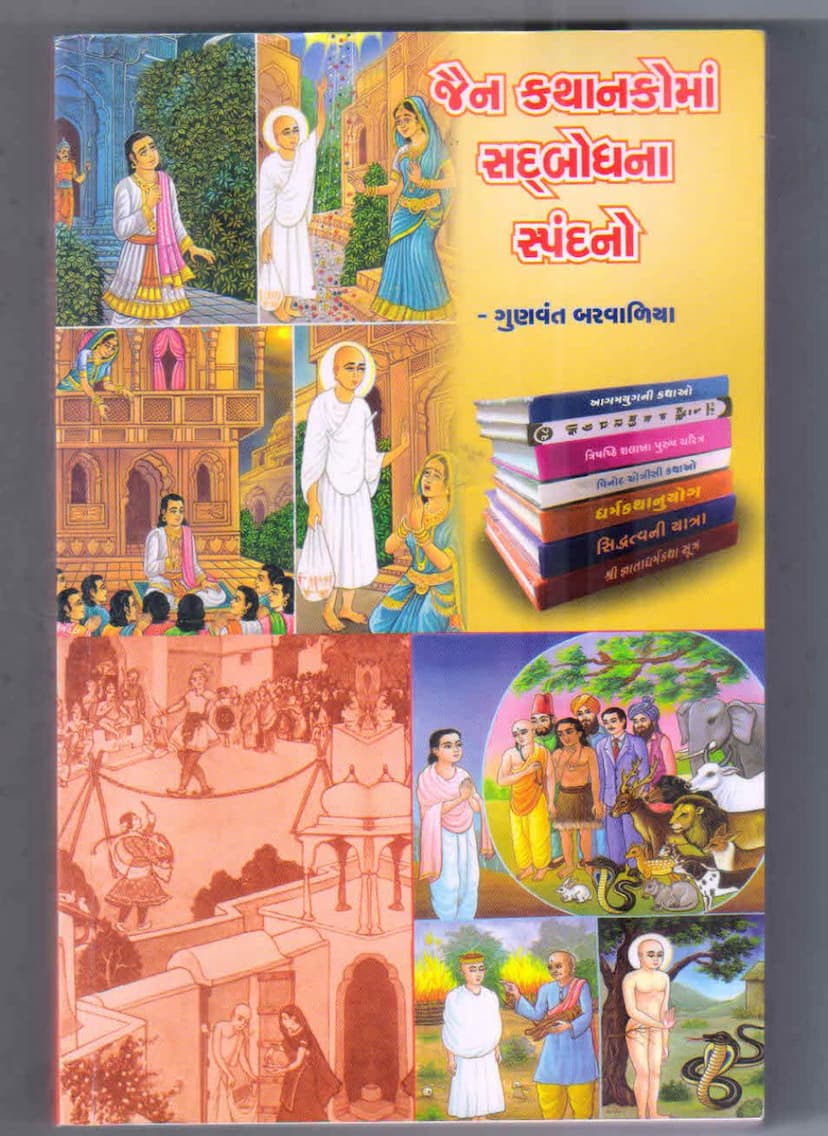Jain Kathanakoma Sadbodhna Spandano
Added to library: September 2, 2025

Summary
Based on the provided text, here is a comprehensive summary of "Jain Kathanakoma Sadbodhna Spandano" (જૈન કથાનકોમાં સદબોધના સ્પંદનો):
Book Title: Jain Kathanakoma Sadbodhna Spandano (જૈન કથાનકોમાં સદબોધના સ્પંદનો) Author: Gunvant Barvalia (Compiled and Edited) Publisher: Arham Spiritual Centre (Managed by SKPG Jain Philosophical & Literary Research Centre, Ghatkopar, Mumbai) Theme: The book is a collection of research papers and essays presented at the 16th Jain Literature Knowledge Conference (જૈનસાહિત્ય જ્ઞાનસત્ર ૧૬) on the topic "Vibrations of Righteousness in Jain Narratives" (જૈન કથાનકોમાં સબોધના સ્પંદનો). It explores how traditional Jain stories (kathanaks) convey moral and spiritual teachings (sadbodh).
Key Aspects and Content:
-
Purpose and Scope: The book aims to highlight the profound moral and spiritual messages embedded within Jain narratives. It showcases how these stories, often drawing from ancient Jain scriptures (Agamas) and historical accounts, serve as powerful tools for imparting ethical values, philosophical principles, and spiritual guidance to a wide audience, from children to scholars.
-
Structure and Content: The book is a compilation of numerous articles by various scholars, each focusing on different Jain kathanaks and their underlying "sadbodhna spandano" (vibrations of righteousness). The table of contents reveals a diverse range of topics and narratives explored, including:
- Equanimity and Detachment: Narratives illustrating equanimity (samattva) and detachment (vitraagta), like those of Rashtrasant P. Gurudev Namramuni M.S.
- Merchant Narratives: Stories like that of Dhanya Sarthvah, emphasizing moral conduct and the consequences of actions.
- Karmic Echoes: The tale of Ikshvaku Rathod and its portrayal of karmic consequences.
- Ethical Dilemmas and Wisdom: Stories like Charudatta's and Sangam's highlight virtues like forgiveness, wisdom, and the importance of righteous conduct.
- The Power of Virtue: Narratives about Champashravika's devotion and its impact, and the story of the emperor of the sun (possibly referring to a powerful ruler who embraced Jain principles).
- The Philosophy of Karma: Several articles delve into the Jain theory of karma, illustrating its principles through stories like Kapil Kevadi's and Mohanlal Dhami's "Velā Velāni Vādali."
- Character Studies: Biographies and analyses of significant Jain figures like Sagar Chakravarti, Ila Alankar, Mahamantri Udayan, Prabhavaka, Sanatkumar Chakravarti, and Harikeshi Muni, exploring their moral and spiritual journeys.
- Motherhood and Sacrifice: The story of Devānandā and Jayabhikkhu's portrayal of maternal love and sacrifice.
- The Significance of Wisdom: The tale of Kapila Kevadi and the role of wisdom in overcoming attachment.
- The Importance of Vinaya and Vaiyavruttya: Stories like Panthak Muni's and the emphasis on respect, service, and proper conduct.
- Purity of Intention: The narrative of the "pure gift" (pavitra bhet) and the concept of knowing past lives (jatismaran).
- The Power of Renunciation: Stories illustrating the benefits of renunciation, such as that of Nami Rajarshi and Gajasukumar.
- The Impact of Tapa (Austerity): Narratives highlighting the transformative power of penance and austerity.
- The Doctrine of Anekantavada: The concept of manifold perspectives and its application in understanding situations, as seen in the story of Bhadra Sarthvahi.
- The Glory of Jain Tirthas: The significance of places of pilgrimage like Shatrunjaya and the stories associated with them.
- The Influence of Jain Literature: The book emphasizes the immense contribution of Jain literature, especially its narrative tradition (kathanu-yog), in shaping ethical values and spiritual understanding. It highlights how stories make profound principles accessible and relatable.
-
Inspiration and Authorship: The book is a testament to the enduring relevance of Jain stories in inspiring individuals towards a righteous and spiritual life. It acknowledges the contributions of many scholars and spiritual leaders, including P. Dr. Viralbhai M.S. for guidance, and features works from prominent figures like Rashtrasant P. Gurudev Namramuni M.S., P. Dr. Aarti Bai Swami, Dr. Gulab Dedhiya, and many others. The compilation is attributed to Gunvant Barvalia, who also contributes an essay on the theme itself.
-
Overall Message: The central theme is that Jain narratives are not merely historical accounts but living sources of wisdom that resonate with timeless truths about karma, dharma, renunciation, compassion, equanimity, and the path to liberation. They offer practical guidance for navigating life's challenges with moral integrity and spiritual insight. The book serves as a valuable resource for understanding and appreciating the rich ethical and philosophical heritage of Jainism through its captivating stories.